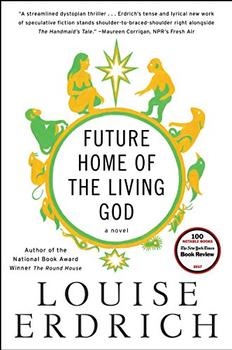Summary | Excerpt | Reading Guide | Reviews | Beyond the book | Read-Alikes | Genres & Themes | Author Bio

From the author of The Bear, the enthralling story of two women separated by millennia, but linked by an epic journey that will transform them both.
40,000 years in the past, the last family of Neanderthals roams the earth. After a crushingly hard winter, their numbers are low, but Girl, the oldest daughter, is just coming of age and her family is determined to travel to the annual meeting place and find her a mate.
But the unforgiving landscape takes its toll, and Girl is left alone to care for Runt, a foundling of unknown origin. As Girl and Runt face the coming winter storms, Girl realizes she has one final chance to save her people, even if it means sacrificing part of herself.
In the modern day, archaeologist Rosamund Gale works well into her pregnancy, racing to excavate newly found Neanderthal artifacts before her baby comes. Linked across the ages by the shared experience of early motherhood, both stories examine the often taboo corners of women's lives.
Haunting, suspenseful, and profoundly moving, The Last Neanderthal asks us to reconsider all we think we know about what it means to be human.
Both protagonists struggle under different circumstances, but it is the similarities of these challenges that Cameron reinforces. Some of these parallels feel too heavily drawn. Cameron offers readers a possible storyline that doesn't differentiate our earliest ancestors from Neanderthals so much as welcome Neanderthals into the human tribe. Rose's narrative demonstrates the academic tension and the cultural resistance to new knowledge when it counters long-held cultural beliefs...continued
Full Review
 (981 words)
(981 words)
(Reviewed by Chris Fredrick).
Claire Cameron's The Last Neanderthal stirs interest in our closest evolutionary relative, Homo neanderthalensis.
 Evidence from both fossil and genetic research suggests that Neanderthals and modern humans evolved from a common ancestor between 500,000 and 200,000 years ago. Neanderthals lived in Europe and southwestern and central Asia. The regions inhabited by Neanderthals overlapped with early Homo sapiens for some period of time, and interbreeding is confirmed: most modern humans have between 1% and 4% Neanderthal DNA.
Evidence from both fossil and genetic research suggests that Neanderthals and modern humans evolved from a common ancestor between 500,000 and 200,000 years ago. Neanderthals lived in Europe and southwestern and central Asia. The regions inhabited by Neanderthals overlapped with early Homo sapiens for some period of time, and interbreeding is confirmed: most modern humans have between 1% and 4% Neanderthal DNA.
The Neanderthals were not much different from us. National Geographic's GENOgraphic project's web page on Neanderthals states that a "growing number of scientists have argued that the Neanderthals' similarities ...

If you liked The Last Neanderthal, try these:

by Louise Erdrich
Published 2018
A startling portrait of a young woman fighting for her life and her unborn child against oppressive forces that manifest in the wake of a cataclysmic event.

by Samantha Hunt
Published 2017
A contemporary gothic from an author in the company of Kelly Link and Aimee Bender, Mr. Splitfoot tracks two women in two times as they march toward a mysterious reckoning.